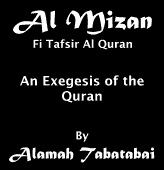
|
| Chapter 2. |
In order to understand the meaning of the infallibility of the Prophets (a.s.) it is necessary, first of all, to know how the action of man affects his life in the Hereafter; and how these actions are instrumental in the dispersal of blessings and evils without any barrier of time and space. We pray to the Almighty to help us in this endeavour. Allah remarks:
(a) In Surah Baqarah:
"The month of Ramazan is that in which the Quran was revealed, a guidance to men and clear proofs of the guidance and the distinction; therefore whoever of you is present in the month, he shall fast therein."
(Surah Baqarah 2:185)
(b) In Surah Qadr:
"Surely We revealed it on the grand night. And what will make you comprehend what the grand night is? The grand night is better than a thousand months. The angels and Ruhul Qudus descend in it by the permission of their Lord for every affair, Peace! it is till the break of the morning." (Surah Qadr 97:1-5)
The Almighty Allah has revealed the Quran on His Last Prophet (s.a.) on a night of the month of Ramazan. So, that night became the night of power (a grand night). On this night every year the angels and Ruhul Qudus (The Holy Spirit) descend by the order of the Almighty. They shall continue to do so till the Day of Qiyamat. Moreover, the blessings of this night have spread to cover the whole month of Ramazan and this shall also continue forever.
In another discussion Insha Allah, we shall study how the day of Friday has become blessed since the time of Hazrat Adam (a.s.), when the Almighty showered His bounties upon him. The ninth night of Zilhaj is also one of the blessed nights. On this night too, the Almighty has bestowed His blessings upon Adam (a.s.) at Mina. He also forgives the sins of His servants on this night. Since that time on the 9th and 10th of Zilhaj, blessings descend upon the people at Mashar, Arafat and Mina. This will also continue till the day of Qiyamat.
Similarly the place where Ibrahim (a.s.) stood while raising the walls of Kaaba has also become blessed. The Almighty has ordered that prayers must be performed at this blessed spot for all the time to come.
He says,
"Appoint for yourselves a place of
prayer on the standing place of Ibrahim."
(Surah Baqarah 2:125)
In the same way evil and ill luck is also caused by the descent of Divine Chastisement on those who perprate evil. For example the land where the People of Aad were punished by the hail of stones from the sky. The Messenger of Allah (s.a.w.s.) pointed out this fact when he passed this place during his expedition to Tabuk. The remark of the Messenger of Allah (s.a.w.s.) concerning this has been preserved in many books of traditions and biography.
Let us read about this interesting incident:
In the year 9 A.H. the Holy Prophet (s.a.w.s.) passed by the area of Hijr during his expedition to Tabuk. Hijr is in the valley of Qura the home of the tribe of Thamud on the route from Madinah to Syria. As the army of the Holy Prophet (s.a.w.s.) crossed this terrain some of the soldiers drew out water from a well. The Messenger of Allah (s.a.w.s.) ordered a caller to announce that no one should drink water from any of the wells in this area and neither should they perform wuzu (ablution) with it. The people emptied their water bags and asked, O Messenger of Allah (s.a.w.s.) shall we knead (the camel feed?). The Holy Prophet (s.a.w.s.) said: "Feed your camels, it should not be that whatever ill luck they had should inflict you too."
When he left that place and passed by the area of Hijr he covered his face with a cloth and spurred his camel1. The soldiers followed suit.
The Holy Prophet (s.a.w.s.) said, "Do not enter the houses of unjust people, except that you weep." A person came to the Holy Prophet (s.a.w.s.) with a ring. It was found in the houses of the people of Aad at the place called Hijr.
The Holy Prophet (s.a.w.s.) turned his face away and hid his face behind his hands so that it may not be seen. He said: "Throw it away!"2And this example has been related by Imam Ali (a.s.) as Nasr Ibne Mujahid has narrated. The words of Nasr in Waqaatul Siffin are:
He says: Muknaf bin Sulaym was walking with Imam Ali (a.s.) at Babel.3 Ali (a.s.) said:
"There is a place in Babel where people had sunk into the earth." Saying this he spurred his animal saying, "We shall recite the Asr prayers beyond this valley." The people followed suit. When he crossed the Bridge of Siraat he halted and led the people in Asr prayers.4
After the Asr prayers he (a.s) said: "This is a place where Chastisement had descended. It is not proper for a prophet or a legatee of a prophet to pray at this place."5 In the same way the spread of bounty (barakat) in the world is connected with a particular period and in the same way the retribution is also associated with a period when the Almighty Allah sent His Chastisement on evil people.
------------
1
Covering the face with ones clothes in haste.2
Mojamul Buldan, Sirat Ibne Hisham, Vol.4, Pg.164-165, Maghazi of Al-Waqidi, Imtail Asmaa,Pg.454-456, Musnad Ahmad, Vol.2., Sahih al-Bukhari, Vol.3, Sahih Muslim, Kitab uz-Zuhud.
3
Babel is in Iraq between Kufa and Baghdad. The Bridge of Siraat is over the river of Siraat near Baghdad. Refer to Mojamul Buldan for Babel and Siraat.4
Siffeen :135.5
Beharul Anwaar, Vol.41, Pg.168, Ilalush Sharaae, Page 124, Basaerud Darajaat, Pg.58. |
 |
 |
 |
| Multimedia |
 Dua Iftitah (mp3) Dua Iftitah (mp3) Abu Thar Al-Halawaji Abu Thar Al-Halawaji |
| listen download |
 Dua Kumail (video) Dua Kumail (video) Medina Medina |
| watch |
 Dua Tawasul (mp3) Dua Tawasul (mp3) Abu Thar Al-Halawaji Abu Thar Al-Halawaji |
| listen download |
 Ar Rahman (mp3) Ar Rahman (mp3) Abdul Basit Abdul Basit |
| listen download |
 Al Faatiha (mp3) Al Faatiha (mp3) Yasir Al-Filkawi Yasir Al-Filkawi |
| listen download |
 Al Anfaal 41-52 (mp3) Al Anfaal 41-52 (mp3) Yasir Al-Filkawi Yasir Al-Filkawi |
| listen download |
| Copyright © 2003 - 2006, www.IntroducingIslam.org [All Rights Reserved] 1179831632 p u sh i sa |
